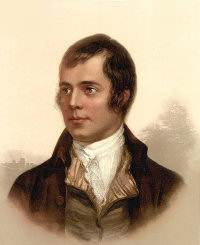Pluck the gowans fine
Q From Barton Brown: I have searched the Web to the best of my ability to find an explanation of the derivation of the phrase plucking the gowans fine, which P G Wodehouse employed many times in his writings. It seems to express the nostalgic recollection of “a good time being had by all”, and the possibility of renewing those good times among long-parted friends. Its etymology seems — online, at least — to be a closed book. Can you shed any light on this curious phrase?
A Wodehouse seems to have used the complete expression only in his later works — the earliest example I’ve found is in the Code of the Woosters of 1938. This is a more recent one:
It was many years since this Cheesewright and I had started what I believe is known as plucking the gowans fine, and there had been a time when we had plucked them rather assiduously.
Joy in the Morning, by P G Wodehouse, 1947.

Robert Burns
The problem in your finding the origin most probably lies in your searching for the whole phrase. It seems to have been invented by Wodehouse and to have been used only by him, since I can’t find it anywhere else. On the other hand, lots of examples of gowans fine turn up in online references, which at once send one to the source. It’s in a song by Robert Burns that later became famous in a rather different form. His version includes this stanza:
We twa hae run about the braes
And pu’d the gowans fine
But we’ve wander’d mony a weary foot
Sin’ auld lang syne.
Auld Lang Syne, by Robert Burns, 1788. The title roughly translates as “times long past”. “Twa” means two; “hae” means have; a “brae” is a hillside; “mony” means many; “sin’” is short for since.
The line needs some translation. Pu’d is the past tense of the Scots verb pou (sometimes written as pu in Burns’s time). This may be translated as “pull”, but it has a rather wider compass. It covers the actions of plucking flowers (or chickens), gathering fruit, or harvesting or collecting produce of any kind. A gowan with a supporting adjective may be a wild flower of several sorts, but standing alone it’s the common daisy. Pu’d the gowans fine may therefore be rendered in modern English less obscurely but also less romantically as “picked the fine daisies”. As you suggest, the line does evoke carefree former times, as Wodehouse meant by it.
There’s no mystery why he chose plucked, which is a perfectly good equivalent of the Scots verb and is both more powerful and evocative than picked. Perhaps the greater mystery is why nobody else seems to have done so.
